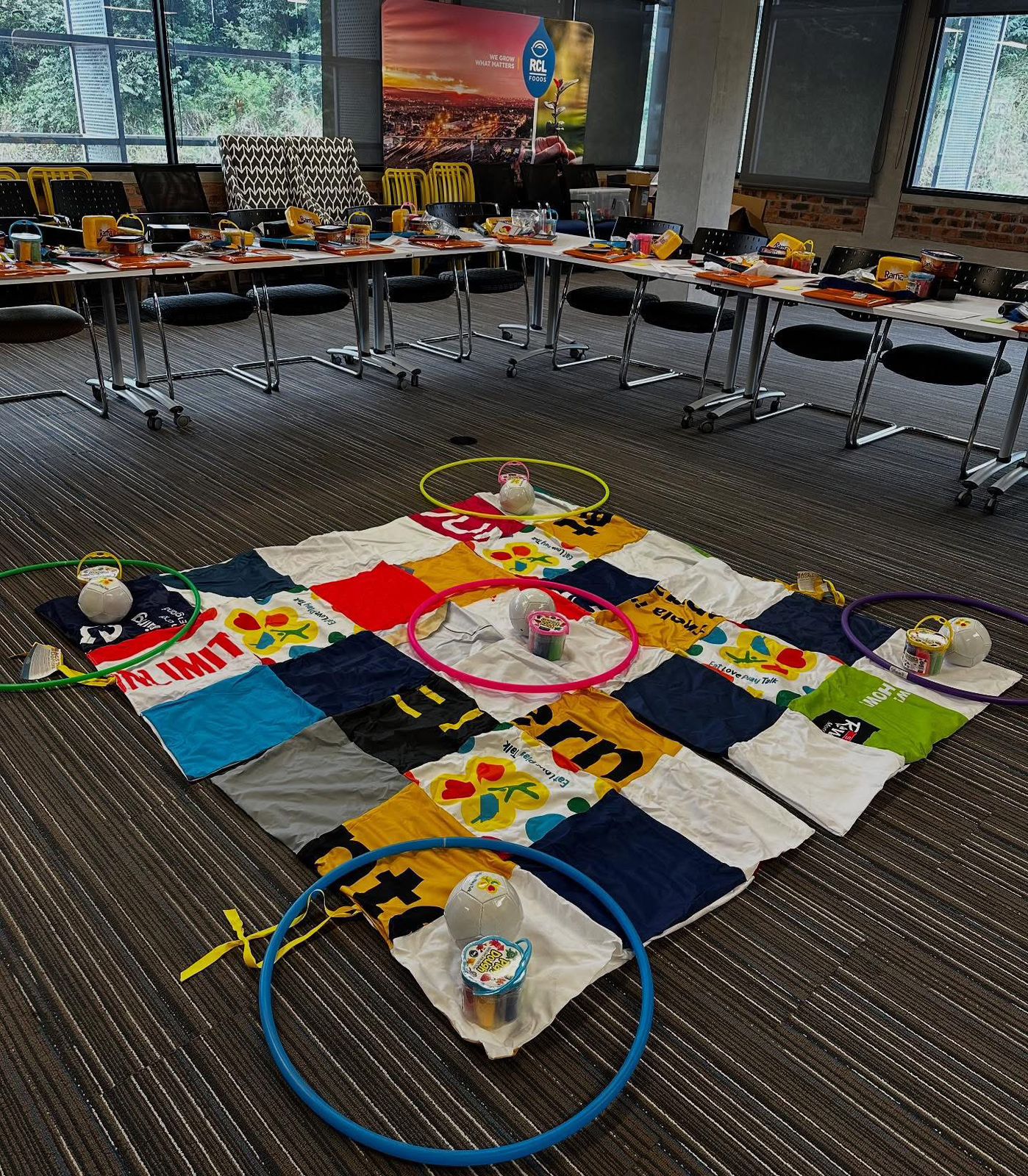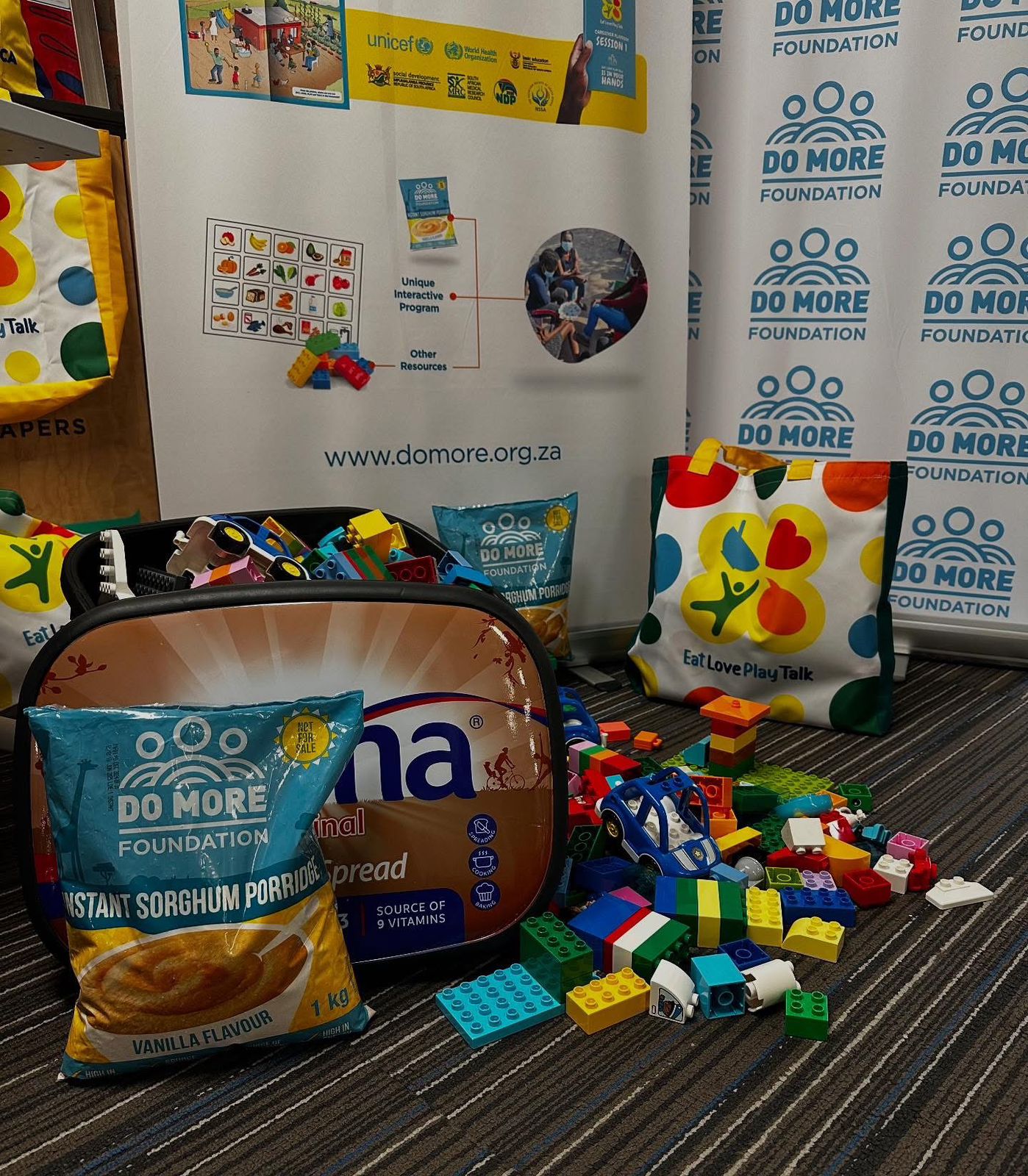Scaling Impact through Play, Conversation and Community: The Power of ELPT’s Master Training Model
12 Aug 2025
In the heart of our deep dive communities, a shift continues to take place, one training at a time.
The EAT LOVE PLAY TALK (ELPT) programme, a community-driven parenting initiative rooted in evidence and empathy, is proving that simple messages can lead to meaningful change for young children and their caregivers. For example, over the past 18 months, 632 participants across five provinces had been trained in the ELPT programme, reaching 15 communities with vital information about healthy eating, loving relationships, playful learning, and language development. The result? A significant boost in confidence and knowledge among participants, with self-reported confidence levels rising from 58.97% to 73.2% after training. This surge in confidence, coupled with a 7.3% increase in correct answers on key message-related questions, underscores the programme’s effectiveness in empowering participants to make a real difference in their communities. At the centre of this movement is a bold approach: a master training model designed not just to inform, but to ignite.
Developed by the DO MORE FOUNDATION and partners, ELPT blends nutrition, play, literacy, and responsive caregiving into a joyful, interactive programme that is anything but didactic. Central to its scale and sustainability is a Train-the-Trainer (TTT) approach.
.jpeg)
DO MORE FOUNDATION selects experienced ECD leaders and facilitates an intensive master training where content and facilitation skills, covering nutrition, attachment, play, and language, are imparted. These master trainers then cascade the learning through a series of interactive, monthly seven session workshops led by local ECD principals or practitioners, using culturally relevant materials in community settings. Ongoing peer support, supervision, and accessible open-source resources ensure fidelity, quality, and sustainability, building local capacity to engage caregivers in habit forming, public health–focused dialogue.
The model is as human-centred as the messages focused on relationship-building, local relevance, and ongoing support. Below are key learnings from the latest master training that are helping ELPT go further, with quality and care.
What Makes This Model Work?
At the heart of the model is quality assurance. “We are committed to the integrity of our key messages,” says Jessica Ronaasen, Advocacy & Innovation Lead. “Whether you’re in KwaMashu or Limpopo, ‘use fats sparingly’ should mean the same thing. That consistency is achieved not by rigid scripts, but by empowering facilitators with both the knowledge and the skills to deliver messages in a way that is locally relevant and respectful.”
Unlike many training models that rely heavily on instruction, ELPT master training is intentionally playful and participatory. From cabbage myths (once believed to be "only for goats") to breastfeeding taboos and smoking during pregnancy, master trainers are encouraged to surface and address community beliefs with care, curiosity, and cultural sensitivity. In one session, a debate around peanut butter being used for colds sparked both laughter and a deeper dive into evidence-based health practices.
Creating a truly participatory, energised environment takes more than content and it requires facilitators who can read the room, respond with flexibility, and create a space where everyone feels safe to share, question, and learn. “That kind of group cohesion doesn’t just happen,” reflects Ronaasen. “It’s an intentional outcome of great facilitation. And once it happens — that’s when the magic begins.”
5 Key Learnings from ELPT’s National Master Training

1. A well-held space is where change begins.
Creating safety in the training room is not accidental. Facilitators intentionally built group cohesion through playful, participatory methods, and allow new bonds to form. This set the tone for open sharing, even on sensitive topics like breastfeeding, food taboos, and parenting struggles. As one participant reflected, “This was the first space I’ve been in where I felt safe to be both wrong and growing.”
2. Facilitation is a competency and it can be taught.
Facilitation in the communities, requires far more than delivering information. The trainings focus on managing group dynamics to leading reflective conversations. Trainers practice and receive feedback on their style and presence, with many reporting a visible leap in their confidence and public speaking ability.
3. Reflective supervision turns training into transformation.
Monthly online sessions after the in-person training play a vital role. These are not check-ins, they are spaces for shared problem-solving, peer mentoring, and personal development. This continuous support structure keeps momentum high, strengthens the community of practice, and helps trainers adapt the content without losing message integrity.
4. Myth-busting can spark real community dialogue.
The adaptable design of ELPT allows facilitators to surface local myths and gently unpack them with empathy. One standout example? In one community, cabbage was believed to be "only for goats." After discussion and reflection, that myth was replaced with new appreciation for its nutrition and accessibility.
5. Practical learning works better when it’s playful.
From food card games to role-playing household scenarios, the use of interactive materials helps trainers and caregivers to internalise key messages. Even when words are forgotten, actions and images often stick. As one trainer put it, “Play doesn’t just make it fun. It makes it real.”
Why It Matters
The impact is evident: more confident facilitators, better-informed caregivers, and children whose lives are improving through small, sustainable changes in their homes. By investing in people and offering informative materials, the ELPT model is uniquely positioned to make a meaningful impact in communities. It builds a knowledge base rooted in local relevance, supported by ongoing supervision, and strengthened through joyful collaboration.
From rural KZN to inner-city Johannesburg, parents are growing food gardens, asking new questions, and making more informed choices around feeding, reading, and responding to their children. Simplified nutrition education is practical and accessible to all.

A Call to Action
We know that the early years are where futures are shaped. ELPT is evidence-based, scalable, and rooted in community.
As we look to grow this work, we invite other NGOs, funders, and corporate partners to join us. Help us train more master trainers, support more caregivers, and unlock more playful, purposeful learning for the next generation.
Let’s continue to build communities where every child is nourished, nurtured, and known.